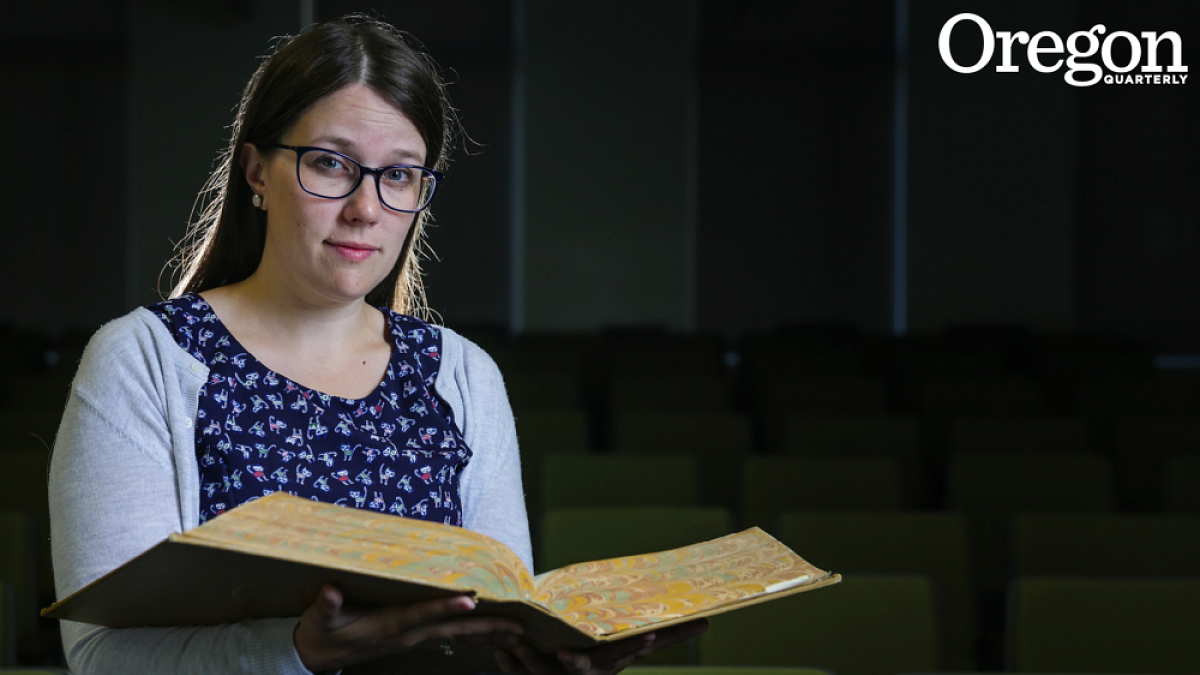LANGUAGE DETECTIVE
With onionskin pages and type so tiny even young eyes cry out for a magnifying glass, the Oxford English Dictionary captivated Melissa Baese-Berk’s inner detective from age three. But she didn’t discover her calling as a linguistics scholar until college.
“As I grew older, I felt I was investigating how language works every time I sat down with the OED. It’s really what I do now, only in a lab rather than with a magnifying glass,” says the 2018 winner of two of the UO’s most prized accolades, the Ersted and Tykeson awards for distinguished teaching.
“I was thrilled to join the UO faculty partly because I’m not a typical linguist,” Baese-Berk says, explaining that her colleagues, unlike their peers at most universities, emphasize behavioral and field data to examine patterns of sound, grammar, and meaning.
“How we learn our first language isn’t well understood,” she says. “Most kids do this easily, without being taught. Trying to figure out what’s behind this, and how adults can capture this ability, is my favorite part of the job.” What she discovers is useful for kids with speech and language difficulties, adults with traumatic brain injuries, immigrants hoping to adapt to a new country, and anyone wishing to learn a second language.
UNDERGRADS MAKE THE LAB GO ’ROUND
The UO’s lab-driven linguistics program is one of the nation’s largest. Paid undergraduate research assistants help collect and analyze data. “In order to have a successful research program in my field, the most important piece is undergraduate researchers,” Baese-Berk says. “If you look at the budget breakdown for my grants, the bulk goes to support them. Not having them would cut my productivity in half.” She also plans to use the honorarium from her Tykeson award to fund undergraduate assistants, saying, “It’s a tremendous bang for the buck.”
WHAT A DIFFERENCE AN “A” MAKES
The long-running controversy over the first words uttered on the moon intrigued Baese-Berk because she could tackle it through linguistic analysis. The world heard Neil Armstrong say “one small step for man,” but he insisted that he’d actually said “one small step for a man.” Working with colleagues at other universities, she set up experiments from the perspective of speech production and listener perception. Their findings support the hypothesis that people tend to perceive one word—“for”—rather than two words “for a,” under conditions similar to those present for Armstrong’s Apollo 11 broadcast.
SOME BECOME STARS
About a dozen undergrads work in Baese-Berk’s lab. Most go on to other things, but some discover their life’s work. In Drew McLaughlin’s case, Baese-Berk could see she was brilliant but lacked confidence. “Drew proceeded to win every prize for undergraduate research, and by the end of the first year, she was presenting her findings about perception of accented speech at an international conference in Boston,” Baese-Berk says. “Watching her transformation from student to researcher to shining star was extraordinary.” McLaughlin, BA ’17 (linguistics), was accepted into every PhD program to which she applied. What’s more, her prize money and research jobs in two labs helped pay for her UO education.
—By Melody Ward Leslie, BA ’79 (humanities)


